Ready to discover the hottest reads of summer? Get ready, because this year, our list is SMOKIN’. Check out everything coming from Tor Books in Summer 2022 here!
June 14
opens in a new window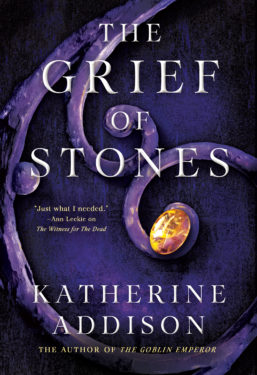 The Grief of Stones by Katherine Addison
The Grief of Stones by Katherine Addison
As a Witness for the Dead, Thara Celehar can speak to the recently departed: see the last thing they saw, know the last thought they had, experience the last thing they felt. It is his duty to use that ability to ascertain the intent of the dead and to find the killers of the murdered. Celehar’s time in the city of Amalo has brought him both friends and enemies—and no little notoriety. Now, when solving the murder of a marquise raises more questions than it answers, he finds himself exploring Amalo’s dark underside.
June 21
opens in a new window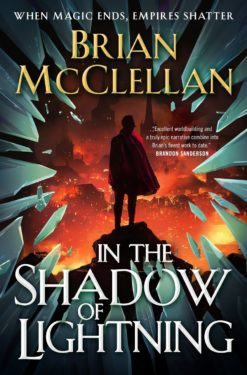 In the Shadow of Lightning by Brian McClellan
In the Shadow of Lightning by Brian McClellan
Demir Grappo is an outcast—he fled a life of wealth and power, abandoning his responsibilities as a general, a governor, and a son. Now he will live out his days as a grifter, rootless, and alone. But when his mother is brutally murdered, Demir must return from exile to claim his seat at the head of the family and uncover the truth that got her killed: the very power that keeps civilization turning, godglass, is running out. Now, Demir must find allies, old friends and rivals alike, confront the powerful guild-families who are only interested in making the most of the scraps left at the table and uncover the invisible hand that threatens the Empire.
June 28
opens in a new window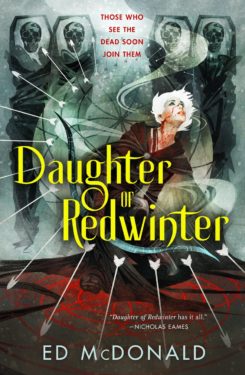 Daughter of Redwinter by Ed McDonald
Daughter of Redwinter by Ed McDonald
Raine can see—and speak—to the dead, a gift that comes with a death sentence. All her life she has hidden, lied, and run to save her skin, and she’s made some spectacularly bad choices along the way. But it is a rare act of kindness—rescuing an injured woman in the snow—that becomes the most dangerous decision Raine has ever made. Because the woman is fleeing from Redwinter, the fortress-monastery of the Draoihn, warrior magicians who answer to no king, and who will stop at nothing to reclaim what she’s stolen. A battle, a betrayal, and a horrific revelation force Raine to enter the citadel and live among the Draoihn. She soon finds that her secret ability could be the key to saving an entire nation.
opens in a new window The Origin of Storms by Elizabeth Bear
The Origin of Storms by Elizabeth Bear
The Lotus Kingdoms are at war, with four claimants to the sorcerous throne of the Alchemical Emperor fielding three armies between them. Alliances are made, and broken, many times over—but in the end, only one can sit on the throne. And that one must have not only the power, but the rightful claim.
opens in a new window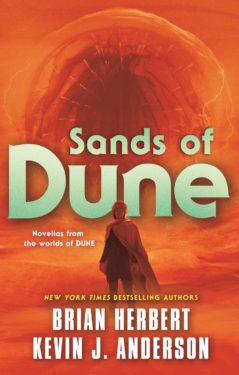 Sands of Dune by Brian Herbert and Kevin J. Anderson
Sands of Dune by Brian Herbert and Kevin J. Anderson
The world of Dune has shaped an entire generation of science fiction. From the sand blasted world of Arrakis, to the splendor of the imperial homeworld of Kaitain, readers have lived in a universe of treachery and wonder. Now, these stories expand on the Dune universe, telling of the lost years of Gurney Halleck as he works with smugglers on Arrakis in a deadly gambit for revenge; inside the ranks of the Sardaukar as the child of a betrayed nobleman becomes one of the Emperor’s most ruthless fighters; a young firebrand Fremen woman, a guerrilla fighter against the ruthless Harkonnens, who will one day become Shadout Mapes.
July 5
opens in a new window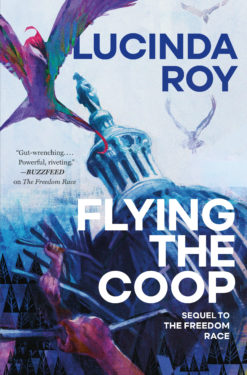 Flying the Coop by Lucinda Roy
Flying the Coop by Lucinda Roy
In the disunited states, no person of color—especially not a girl whose body reimagines flight—is safe. A quest for Freedom has brought former Muleseed Jellybean “Ji-ji” Silapu to D.C., aka Dream City, the site of monuments and memorials—where, long ago, the most famous Dreamer of all time marched for the same cause. As Ji-ji struggles to come to terms with her shocking metamorphosis and her friends, Tiro and Afarra, battle formidable ghosts of their own, the former U.S. capital decides whose dreams it wants to invest in and whose dreams it will defer. The journeys the three friends take to liberate themselves and others will not simply defy the status quo, they will challenge the nature of reality itself.
opens in a new window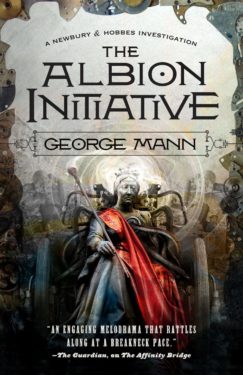 The Albion Initiative by George Mann
The Albion Initiative by George Mann
Victorian England comes fully alive in true steampunk fashion, with dazzling inventions and airships flying over the city, while clockwork automatons race across the streets. But there’s a sinister side to all this new technological progress. George Mann’s Newbury & Hobbes steampunk series concludes as our special agent heroes discover a plot of empire-changing proportions in The Albion Initiative.
July 12
opens in a new window The Memory in the Blood by Ryan Van Loan
The Memory in the Blood by Ryan Van Loan
When her quest to destroy the Gods began, Buc was a child of the streets. Now she is a woman of steel, shaped by gaining and losing power, tempered by love and betrayal, and honed to a fine edge by grief and her desire for vengeance. A perilous, clandestine mission to a hidden library uncovers information that is key to destroying both the Dead Gods and their enemy, the Goddess Ciris. Ciris’s creation, Sin, who lives inside Buc, gives her superhuman abilities and tempts her with hints of even greater power. With that power, she could achieve almost anything—end the religious war tearing her world apart, remake society at a stroke—but the price would be the betrayal of everything she has fought for . . . and the man she loved would still be dead.
opens in a new window Mythago Woods by Robert Holdstock
Mythago Woods by Robert Holdstock
The mystery of Ryhope Wood, Britain’s last fragment of primeval forest, consumed George Huxley’s entire long life. Now, after his death, his sons have taken up his work. But what they discover is numinous and perilous beyond all expectation. For the Wood, larger inside than out, is a labyrinth full of myths come to life, “mythagos” that can change you forever. A labyrinth where love and beauty haunt your dreams…and may drive you insane.
July 19
opens in a new window Just Like Home by Sarah Gailey
Just Like Home by Sarah Gailey
Coming home is hard enough for Vera, and to make things worse, she and her mother aren’t alone. A parasitic artist has moved into the guest house out back and is slowly stripping Vera’s childhood for spare parts. He insists that he isn’t the one leaving notes around the house in her father’s handwriting… but who else could it possibly be? There are secrets yet undiscovered in the foundations of the notorious Crowder House. Vera must face them and find out for herself just how deep the rot goes.
July 26
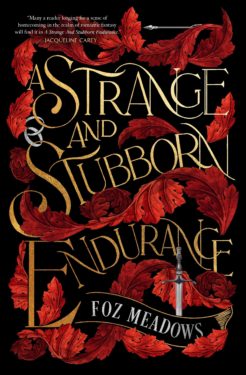 opens in a new windowA Strange and Stubborn Endurance by Foz Meadows
opens in a new windowA Strange and Stubborn Endurance by Foz Meadows
Velasin vin Aaro never planned to marry at all, let alone a girl from neighboring Tithena. When an ugly confrontation reveals his preference for men, Vel fears he’s ruined the diplomatic union before it can even begin. But while his family is ready to disown him, the Tithenai envoy has a different solution: for Vel to marry his former intended’s brother instead. Caethari Aeduria always knew he might end up in a political marriage, but his sudden betrothal to a man from Ralia, where such relationships are forbidden, comes as a shock. With an unknown faction willing to kill to end their new alliance, Vel and Cae have no choice but to trust each other. Survival is one thing, but love—as both will learn—is quite another.
opens in a new window Three Miles Down by Harry Turtledove
Three Miles Down by Harry Turtledove
It’s 1974, and Jerry Stieglitz is a grad student in marine biology at UCLA with a side gig selling short stories to science fiction magazines, just weeks away from marrying his longtime fiancée. Then his life is upended by grim-faced men from three-letter agencies who want him to join a top-secret “Project Azorian” in the middle of the north Pacific Ocean—and they really don’t take “no” for an answer. Further, they’re offering enough money to solve all of his immediate problems. Joining up and swearing to secrecy, what he first learns is that Project Azorian is secretly trying to raise a sunken Russian submarine, while pretending to be harvesting undersea manganese nodules.
opens in a new window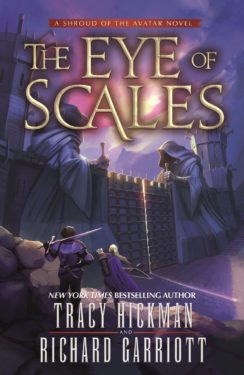 The Eye of Scales by Tracy Hickman and Richard Garriott
The Eye of Scales by Tracy Hickman and Richard Garriott
Aren Bendis, former soldier in the Obsidian army, has managed to protect a rebel city from his former friends and now finds his fate bound to a weapon once wielded by the Avatars themselves. Now, he is being secreted away to the capital of the last alliance of free nations with the hopes that the Hero of Opalis will lead their army against his former masters. What Aren doesn’t know is that his former friend Evard Dirae, a Craft Master of the Obsidian Order, is seeking Aren out. Worried that Aren is being manipulated against his will by the magic of the Avatars, Evard seeks to find the sword and break its hold over Aren once and for all.
August 2
opens in a new window The Book Eaters by Sunyi Dean
The Book Eaters by Sunyi Dean
Out on the Yorkshire Moors lives a secret line of people for whom books are food, and who retain all of a book’s content after eating it. To them, spy novels are a peppery snack; romance novels are sweet and delicious. Devon is part of The Family, an old and reclusive clan of book eaters. Her brothers grow up feasting on stories of valor and adventure, and Devon—like all other book eater women—is raised on a carefully curated diet of fairy tales and cautionary stories. But real life doesn’t always come with happy endings, as Devon learns when her son is born with a rare and darker kind of hunger—not for books, but for human minds.
opens in a new window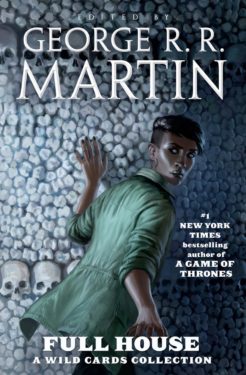 Full House by George R. R. Martin
Full House by George R. R. Martin
In hardcover for the first time, Full House brings together the Wild Cards stories that have been previously published on Tor.com, including works from Daniel Abraham, Cherie Priest, David D. Levine, Walter Jon Williams, Paul Cornell, Carrie Vaughn, Caroline Spector, Stephen Leigh, Melinda M. Snodgrass, and more!
August 9
opens in a new window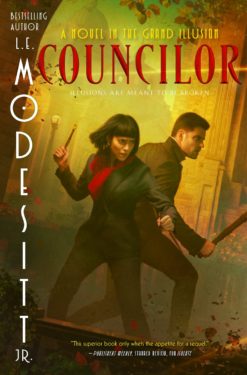 Councilor by L. E. Modesitt, Jr.
Councilor by L. E. Modesitt, Jr.
Continued poor harvests and steam-powered industrialization displace and impoverish thousands. Protests grow and gather followers. Against this rising tide of social unrest, Steffan Dekkard, newly appointed to the Council of Sixty-Six, is the first Councilor who is an Isolate, a man invulnerable to the emotional manipulations and emotional surveillance of empaths. This makes him dangerous. As unknown entities seek to assassinate him, Dekkard struggles to master political intrigue and infighting, while introducing radical reforms that threaten entrenched political and corporate interests.
August 16
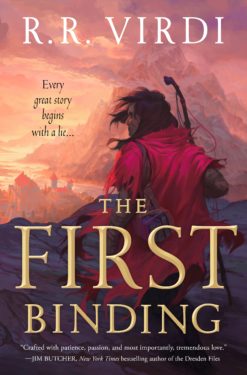 opens in a new windowThe First Binding by R.R. Virdi
opens in a new windowThe First Binding by R.R. Virdi
The first book in this fast-paced, worldbuilding series, The First Binding, tells the story of Ari, an immortal wizard hiding as a storyteller. Ari’s buried villages, killed gods, stolen magic, and knows he is a monster for it. On the run and seeking obscurity in a remote tavern, he and his companion, a singer, soon find their pasts aren’t forgotten, and neither are their enemies.
opens in a new window Dance with the Devil by Kit Rocha
Dance with the Devil by Kit Rocha
Tobias Richter, the fearsome VP of Security of the TechCorps is dead. The puppetmaster is gone and the organization is scrambling to maintain control by ruthlessly limiting Atlanta’s access to resources, hoping to quell rebellion. Our band of mercenary librarians have decided that the time for revolution has come. Maya uses her wealth of secrets to weaken the TechCorps from within. Dani strikes from the shadows, picking off the chain of command one ambush at a time. And Nina is organizing their community—not just to survive, but to fight back. When Maya needs to make contact with a sympathetic insider, Dani and Rafe are the only ones with the skill-set and experience to infiltrate the highest levels of the TechCorps.


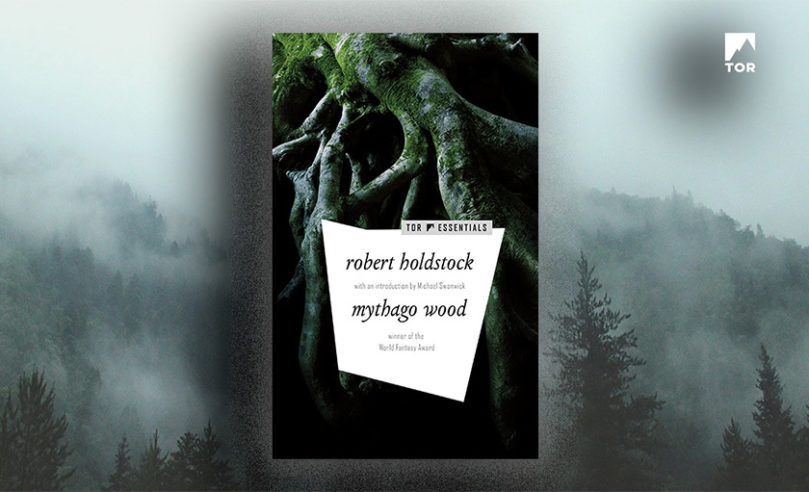






 The Black Company
The Black Company Worlds of Exile and Illusion
Worlds of Exile and Illusion Up Against It
Up Against It Growing Up Weightless
Growing Up Weightless The Fifth Head of Cerberus
The Fifth Head of Cerberus